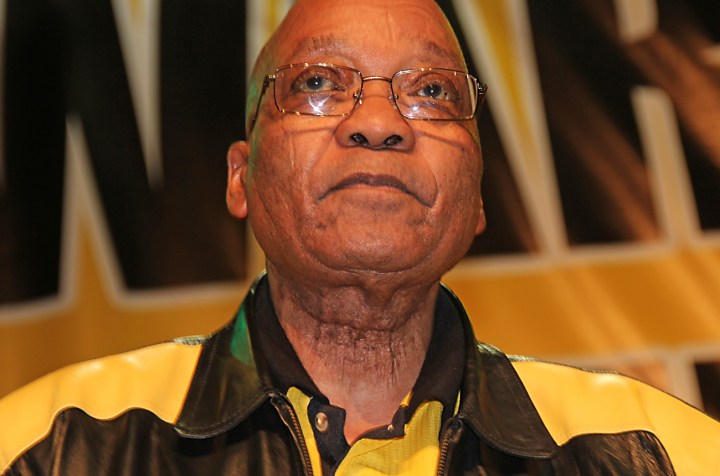Politics
Oil-for-food fight – Zuma shows he can give as good as he got

President Jacob Zuma is giving as good as he got these days in his pre-Mangaung face-off with political opponents. Still, it is a strategy that involves massive risk, depending on how well this high-stakes game of political chess is played. By CHRIS VICK.
First it was last month’s announcement of an investigation into the multibillion-rand arms deal – neatly knifing any prospect of a “Thabo Mbeki for chairman” revival campaign. Tellingly, this step involves an anti-corruption investigation using state agencies and resources – a key accusation made against Mbeki when Zuma was forced out of office.
On Tuesday it was the announcement that Zuma is going to publicly release the Donen Commission’s incomplete report on South African involvement in the UN oil-for-food programme – which probed Kgalema Motlanthe and Tokyo Sexwale’s business dealings with Saddam Hussein’s regime. Here, the strategy seems to be to raise uncertainty about potential presidential candidates by using the media – again, a key accusation made by the Zuma camp during the Mbeki era.
The media frenzy could get additional legs if Public Protector Thuli Madonsela lives up to her announcement earlier this year that she intends to investigate South African aspects of the oil-for-food programme. Zuma learnt, through his own climb to power, that the media can be relentless if pointed in the right direction. So the combined effect of Donen and Madonsela investigations could be critical in shaping perceptions of the pretenders to the throne in the run-up to Mangaung.
Zuma’s office has also learnt the power of the pre-emptive disclaimer: spokesman Mac Maharaj was quick to caution yesterday that “the presidency is aware of the potential misuse of the contents of the [Donen] report and wishes to caution that the comments made about individuals must not be elevated to findings of fact as these were interim and untried comments.”
He knows as well as anyone that releasing an incomplete report could fuel calls for a new or full investigation – which means those named in Donen’s report may have to run the gauntlet not once, but twice: first when the incomplete report is released, and again when the proper investigation is concluded. And yet again, possibly, when the Public Protector has her way.
But by then, the court of public opinion will have more than wrapped its teeth around the allegations which formed the basis of the Donen Commission’s terms of the reference, and dissected whatever evidence the commission found before it was called off by then-president Mbeki.
It’s a reputational roller-coaster, particularly when you realise that a proper investigation of Oilgate would needs to go much wider than the angle the majority of media has focused on so far (that Oilgate was a channel for funding the ANC, through dead businessman Sandi Majali and his supposed links to Motlanthe).
The real deal, as the report puts it, is as follows: On 10 December 1996, after six years of facing export prohibitions as a result of sanctions, Iraq was authorised to sell its crude oil under the Oil-for-Food Programme. Iraq sold approximately $64.2 billion of Iraqi crude oil during the programme. Under Resolution 986, Iraq could choose to whom it sold oil. It exercised its discretion to award oil contracts to its significant advantage.
The first factor was influencing public opinion in favour of ending sanctions against Iraq. Later in the programme, Iraq sought to generate illicit income outside of the UN’s oversight. One source of illicit income was from so-called “surcharges” paid on crude oil contracts under the programme. The Iraqi regime demanded that payments be made to Iraqi-controlled bank accounts and Iraqi embassies abroad.

A graphic from the UN report detailing the flow of funds.
Iraq earned $228.8-million from these surcharges. The “surcharges” were, in plain language, bribes. And the UN report finds that three South African companies played along with the “surcharge” arrangement. A bit like the way arms companies pay bribes to get weapons contracts. The companies involved, according to the UN report, were Montega Trading and Imvume Management, both run by Majali and involving Motlanthe in varying degrees, and Mocoh Trading, of which Sexwale was a director.
Majali seems to have given the Iraqis the run-around when it came to the payment of his surcharges – after initially agreeing, he reneged on the first payment (old habits, seemingly, die hard) but eventually paid $60,000 to the Iraqis to facilitate future transactions. When approached by the UN investigators, however, he denied this was a surcharge. Although Motlanthe is not implicated in paying surcharges, the UN report says he played a significant role in getting Majali access to the key Iraqi dealmakers and in entrenching the perception that Majali was representing the ANC.
According to the report, more than half-a-million dollars was paid by Mocoh in “surcharges” as follows:
- Mocoh Services South Africa: Contract M/08/54, total contract value $27 million, surcharge paid $94,631. Deposit paid by Michael Hacking, a Mocoh director, into the Jordan National Bank on 15 July 2001. The report states that the deposit had been cross-checked with information from the Iraqi embassy and/or bank records.
- Mocoh Services South Africa: Contract M/09/40, total contract value $46 million, surcharge paid $479,489.25. Deposit of $480,087.56 paid by Michael Hacking into two payments to the Jordan National Bank on 12 April 2001 and 15 July 2001. The report states that the deposit had been cross-checked with information from the Iraqi embassy and/or bank records.
- When Mbeki appointed the Donen commission in February 2006, Sexwale welcomed the move as an opportunity to clear his name. He maintains he was not aware of the existence of the surcharge and denies any payments were made.
The release of the incomplete report may prove to be a headache, though, and could force Sexwale to relive his business dealings with a now-dead dictator in a war zone more than 10 years ago, raising foreign policy and other issues. The same applies to Motlanthe although he, true to form, has kept a genteel silence whenever Oilgate has come up (as appears to be his general political modus operandi).
The ultimate irony, of course, is that Zuma may just have over-played his hand this time – enabling Motlanthe and Sexwale to turn the Donen process into an opportunity rather than an obstacle. Already, just hours after yesterday’s announcement, political opposition parties were accusing Zuma of using the report to deal with political opponents, and social media platforms were buzzing with suggestions that Zuma was being “vengeful”. If that emotion gets some traction inside the ANC rather than on Twitter it could give Sexwale, in particular, space to continue playing the role of victim.
Motlanthe, of course, can be expected to continue letting others do the howling. His posture of standing still and letting arguments blow themselves out – or letting his opponents blow themselves out, or up – has worked well so far. So while he continues to criticise Zuma in increasingly scathing tones behind the scenes, he’ll be able to keep moving by standing still until a formal nomination comes from one or other party structure. And with the prospect of a potentially bloody battle over oil for food, it looks like that could happen sooner rather than later. DM
Disclosure: Vick has previously worked as Sexwale’s PR consultant and political advisor, including the period when the UN report was released. He now runs his own communications consultancy (www.codeblack.co.za) and does not do any work for Sexwale, his government department or his business entities.
Main photo: President Jacob Zuma. Reuters




 Become an Insider
Become an Insider